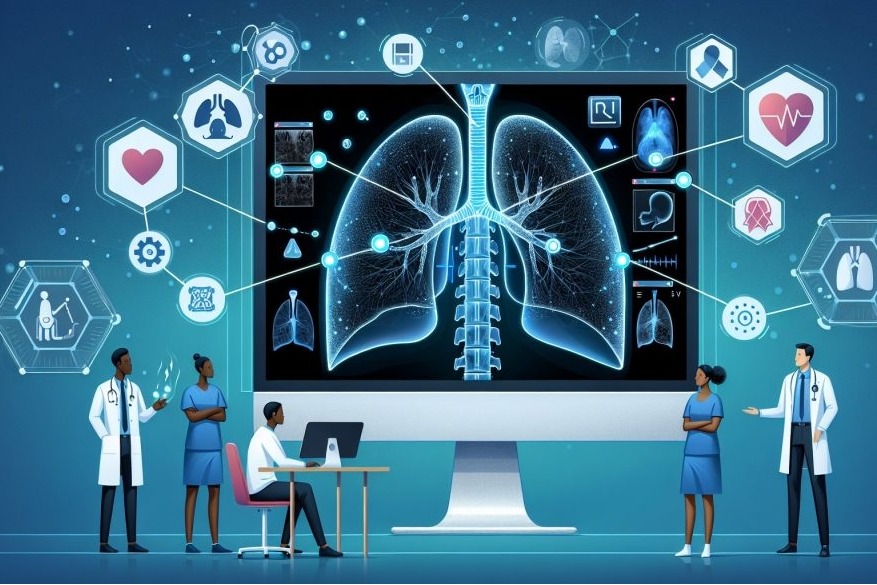New AI tool identifies non-smokers at high risk for lung cancer

New York, Nov 24: A novel artificial intelligence (AI) tool can identify non-smokers who are at high risk for lung cancer using a routine chest X-ray image, according to researchers, including one of Indian-origin.
Lung cancer is the most common cause of cancer death.
Approximately 10-20 per cent of lung cancers occur in "never-smokers" -- people who have never smoked cigarettes or smoked fewer than 100 cigarettes in their lifetime.
In the study, researchers set out to improve lung cancer risk prediction in never-smokers by testing whether a deep learning model could identify never-smokers at high risk for lung cancer, based on their chest X-rays from the electronic medical record.
Deep learning is an advanced type of AI that can be trained to search X-ray images to find patterns associated with disease.
"A major advantage to our approach is that it only requires a single chest-X-ray image, which is one of the most common tests in medicine and widely available in the electronic medical record," said lead author Anika S. Walia, a medical student at Boston University School of Medicine.
The "CXR-Lung-Risk" model was developed using 147,497 chest X-rays of 40,643 asymptomatic smokers and never-smokers to predict lung-related mortality risk, based on a single chest X-ray image as input.
The researchers externally validated the model in a separate group of never-smokers having routine outpatient chest X-rays from 2013 to 2014.
The primary outcome was a six-year incident of lung cancer. Of 17,407 patients (mean age 63 years) included in the study, 28 per cent were deemed high risk by the deep learning model, and 2.9 per cent of these patients later had a diagnosis of lung cancer.
The high-risk group well exceeded the 1.3 per cent six-year risk threshold where lung cancer screening CT is recommended by National Comprehensive Cancer Network guidelines.
There was still a 2.1 times greater risk of developing lung cancer in the high-risk group compared to the low-risk group.
"This AI tool opens the door for opportunistic screening for never-smokers at high risk of lung cancer, using existing chest X-rays in the electronic medical record," said Michael T. Lu, director of artificial intelligence and co-director of Cardiovascular Imaging Research Center (CIRC) at Massachusetts General Hospital (MGH).
"Since cigarette smoking rates are declining, approaches to detect lung cancer early in those who do not smoke are going to be increasingly important."
Lung cancer is the most common cause of cancer death.
Approximately 10-20 per cent of lung cancers occur in "never-smokers" -- people who have never smoked cigarettes or smoked fewer than 100 cigarettes in their lifetime.
In the study, researchers set out to improve lung cancer risk prediction in never-smokers by testing whether a deep learning model could identify never-smokers at high risk for lung cancer, based on their chest X-rays from the electronic medical record.
Deep learning is an advanced type of AI that can be trained to search X-ray images to find patterns associated with disease.
"A major advantage to our approach is that it only requires a single chest-X-ray image, which is one of the most common tests in medicine and widely available in the electronic medical record," said lead author Anika S. Walia, a medical student at Boston University School of Medicine.
The "CXR-Lung-Risk" model was developed using 147,497 chest X-rays of 40,643 asymptomatic smokers and never-smokers to predict lung-related mortality risk, based on a single chest X-ray image as input.
The researchers externally validated the model in a separate group of never-smokers having routine outpatient chest X-rays from 2013 to 2014.
The primary outcome was a six-year incident of lung cancer. Of 17,407 patients (mean age 63 years) included in the study, 28 per cent were deemed high risk by the deep learning model, and 2.9 per cent of these patients later had a diagnosis of lung cancer.
The high-risk group well exceeded the 1.3 per cent six-year risk threshold where lung cancer screening CT is recommended by National Comprehensive Cancer Network guidelines.
There was still a 2.1 times greater risk of developing lung cancer in the high-risk group compared to the low-risk group.
"This AI tool opens the door for opportunistic screening for never-smokers at high risk of lung cancer, using existing chest X-rays in the electronic medical record," said Michael T. Lu, director of artificial intelligence and co-director of Cardiovascular Imaging Research Center (CIRC) at Massachusetts General Hospital (MGH).
"Since cigarette smoking rates are declining, approaches to detect lung cancer early in those who do not smoke are going to be increasingly important."

